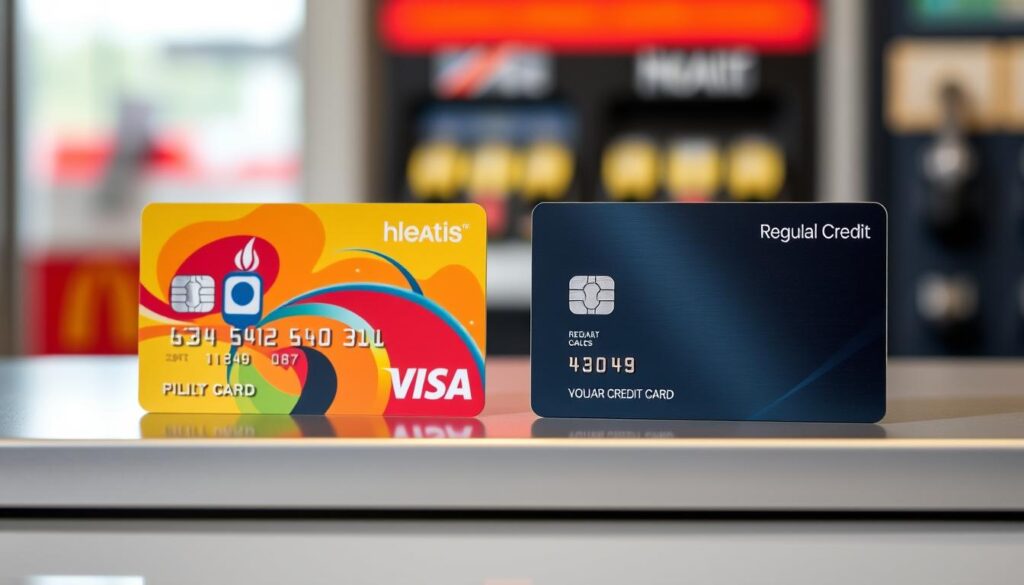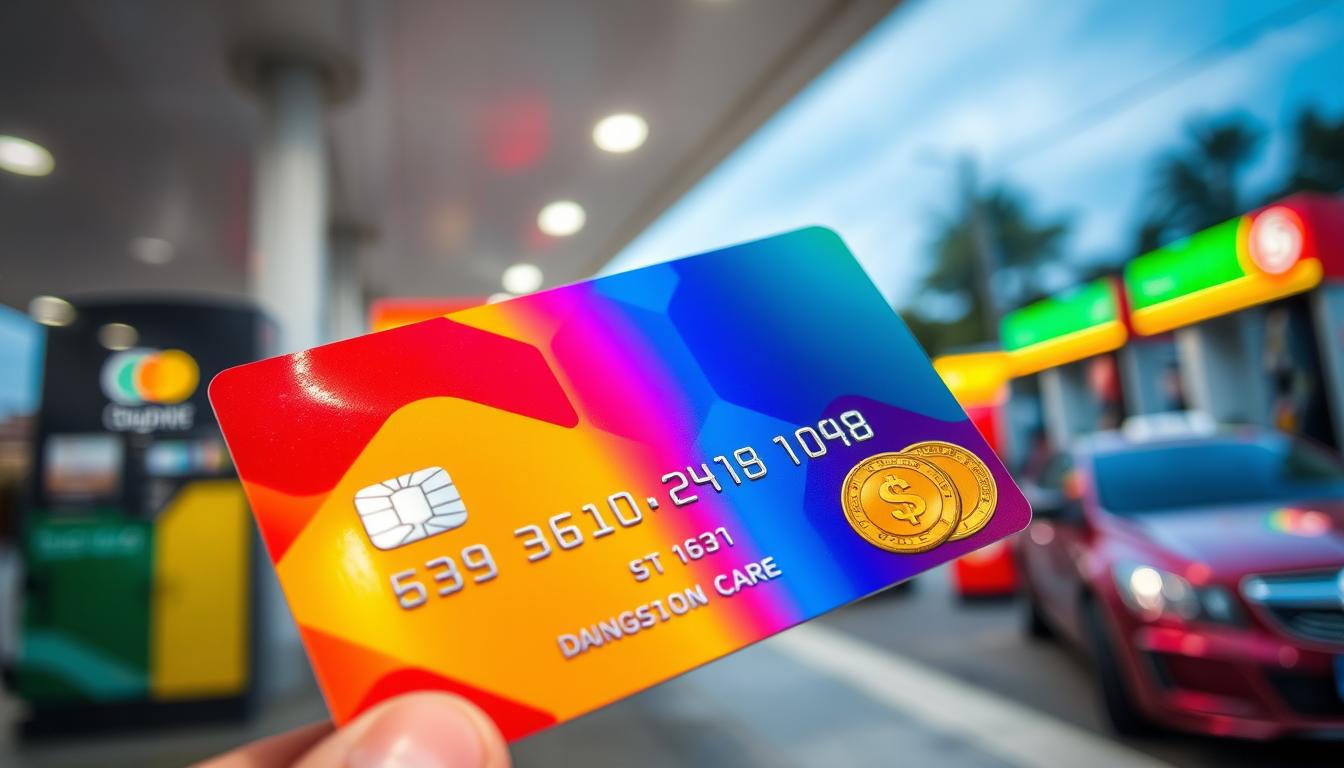Americans, on average, spend over $2,000 annually on gasoline, a figure that underscores the need for cost-effective fuel solutions. The gas card emerges as a pivotal tool, offering exclusive fuel discounts and enhancing gas savings. By utilizing a gas credit card, you unlock rewards and budgeting tools, crucial for managing fuel expenses. Whether you’re a frequent traveler or a daily commuter, a gas card can profoundly impact your financial health, providing much-needed relief in today’s economic climate.
Key Takeaways
- Gas cards can offer valuable fuel discounts and rewards.
- On average, Americans spend over $2,000 each year on gasoline.
- A gas credit card helps you better manage fuel expenses.
- Using a gas card can greatly contribute to your overall savings.
- Selecting the right gas card is crucial for maximizing benefits.
What is a Gas Card?
A gas card is a specialized financial tool designed for those aiming to reduce their fuel costs. It serves as a fuel card, offering financial benefits through a gas benefits program. These cards can be obtained from various gas station brands or financial institutions, allowing users to select based on their specific needs.
Definition and Purpose
The main goal of a gas card is to assist users in saving money on fuel. By using a gas card, consumers can enjoy discounts at the pump, accumulate rewards points, and sometimes receive cash back on their fuel purchases. As fuel prices continue to rise, a dedicated gas benefits program aids in more effectively budgeting for gasoline expenses.
How It Works
A gas card simplifies the fuel purchase process, making expense tracking straightforward. Users can monitor their spending through online accounts, facilitating better budgeting. Some gas cards offer additional savings based on the user’s payment history, enhancing the overall savings potential through a gas benefits program. For a deeper understanding, refer to this detailed explanation.
Different Types of Gas Cards
Exploring the realm of gas cards reveals a spectrum of options, each designed to cater to distinct needs. From personal use to corporate expense management, the variety is vast. This section delves into three primary categories: retail credit cards, general-purpose cards, and fleet cards.
Retail Credit Cards
Retail credit cards are typically affiliated with specific gas stations, offering exclusive discounts and rewards for fuel purchases at those locations. Users can accumulate points, receive cash back, or partake in special promotional offers. This card type is particularly beneficial for individuals who frequently refuel at the same stations, maximizing both savings and rewards.
General-Purpose Cards
Contrasting with retail credit cards, general-purpose cards allow users to earn rewards and cash back across a broader spectrum of fuel stations. Their versatility makes them suitable for everyday spending and travel, with many offering higher cash back percentages on gas purchases. This makes them an attractive option for those with diverse spending habits.
Fleet Cards
Fleet cards are specifically tailored for businesses managing fleets of vehicles and drivers. They facilitate the tracking of fuel expenses, expense management, and streamlined reporting. These cards often include customized benefits, such as fuel discounts at partner stations and advanced transaction tracking, proving indispensable for commercial fleets.
Benefits of Using a Gas Card
https://www.youtube.com/watch?v=M_aYkpCJ_jA
Gas cards present a multitude of advantages, significantly impacting your financial management when refueling your vehicle. Their strategic application can yield considerable fuel savings, rewarding cash back, and aid in budgeting. Investigating these benefits can assist in deciding whether a gas rebate card or a gas rewards program aligns with your lifestyle.
Fuel Savings and Discounts
The allure of gas cards primarily stems from their potential to reduce fuel costs. These cards often offer discounts at the pump, significantly lowering the cost per gallon. For those who frequently travel, these savings can rapidly add up, leading to lower overall expenses. Users of gas rebate cards can further enhance their savings by leveraging special promotions or bonuses at participating stations.
Reward Points and Cash Back
Reward points systems are another compelling feature of gas cards. As you refuel, you accumulate points that can be exchanged for cash back or discounts on future fuel purchases. This introduces a rewarding element to fueling your vehicle, allowing you to earn rewards without altering your routine. By joining a gas rewards program, you can increase your savings, making each fueling trip more beneficial.
Budgeting Help
Budgeting can be a complex task, but gas cards can make it more manageable. These cards often provide detailed spending reports, enabling users to track fuel expenses with ease. This understanding of your spending habits empowers you to make informed decisions about fuel usage. With clear insights into weekly or monthly spending, you can effectively manage your budget, ensuring your fuel costs align with your financial objectives.
How to Choose the Right Gas Card
Selecting a gas credit card necessitates a meticulous evaluation of several critical factors. It is imperative to assess your personal fuel consumption, scrutinize the fees and interest rates, and compare the rewards programs. This approach will facilitate the identification of the most suitable gas card for your requirements. Such a choice can significantly contribute to gas savings and improve your financial management.
Assessing Your Fuel Usage
Begin by accurately gauging your monthly fuel expenditure. This evaluation is fundamental in identifying the fuel card that best complements your driving patterns. Consider your travel frequency, whether for professional obligations, leisure trips, or daily commutes. This understanding is crucial for selecting a gas card that maximizes rewards based on your specific fuel consumption.
Analyzing Fees and Interest Rates
Diverse gas credit cards present different fee structures and interest rates. It is essential to comprehend any annual fees, late payment penalties, and the applicable purchase interest rate. High fees can nullify the benefits of rewards programs. Conversely, a low-interest rate is advantageous, particularly if you anticipate carrying a balance. Therefore, a thorough analysis of these aspects is critical.
Comparing Rewards Programs
Each fuel card boasts a distinct rewards program. Some offer cash back percentages, while others provide points for discounts or free gas. It is vital to determine which type of rewards aligns with your priorities. If you frequently refuel at specific stations, opt for a card that offers enhanced rewards at those locations. This strategic selection maximizes your gas savings.
Top Gas Cards Available in the Market
Opting for the most suitable gas card is paramount for those seeking to enhance their fuel savings. The market presents a variety of options, each tailored to different consumer needs, thereby facilitating the acquisition of fuel discounts and rewards. Below are three exemplary choices:
Chase Freedom Flex
The Chase Freedom Flex card stands out for its adaptable earning potential. It offers cash back in rotating categories, including fuel purchases. Users can accumulate 5% cash back on up to $1,500 in combined purchases within bonus categories each quarter. Its absence of an annual fee makes it particularly appealing for maximizing fuel discounts.
Discover it® Cash Back
This card boasts an impressive 5% cash back on everyday purchases in rotating categories, which frequently include gas stations. Additionally, new cardholders benefit from a cash back matching program during the first year, effectively doubling their gas savings. The Discover it® Cash Back card is devoid of an annual fee, rendering it an excellent option for those on a budget.
Chemron and Texaco Gas Card
For patrons of specific brands, the Chevron and Texaco Gas Card is a standout. It provides fuel discounts and a rewards program exclusive to its network of gas stations. Customers earn points for each purchase, redeemable for fuel discounts or merchandise. It is a prudent choice for regular drivers who frequently refuel at these stations.
How to Apply for a Gas Card

Securing a gas card is a streamlined endeavor, aimed at curtailing fuel costs. The application process spans two primary avenues: online and in-store submissions. Each pathway boasts unique benefits, catering to diverse user preferences and lifestyles.
Online Applications
The allure of an online gas card application lies in its convenience. It necessitates a visit to the gas station’s website or that of a collaborating financial entity. The requisite information encompasses basic personal and financial details, accessible from your domicile. This method’s efficiency ensures swift transaction processing, facilitating immediate access to the card’s benefits upon approval.
In-Store Applications
Conversely, in-store applications offer a more tactile experience. Engaging with a gas station representative allows for a hands-on approach to the application process. Often, this interaction culminates in immediate approval, empowering users to commence saving on fuel expenses without delay.
Understanding Gas Card Fees and Interest Rates
Exploring the realm of gas credit cards necessitates a thorough understanding of the associated costs. The fees attached to these cards can profoundly affect your savings, thereby influencing your choice. This section delves into the common fees and the pivotal role of interest rates.
Common Fees Explained
Gas cards often come with various fees that users must be cognizant of:
- Annual Fees: Certain gas credit cards impose an annual fee, which can diminish your savings.
- Late Payment Fees: Failure to meet payment deadlines can result in penalties, escalating the total cost of card usage.
- Foreign Transaction Fees: Utilizing your gas card abroad may incur additional charges.
Grasping these fees is essential for accurately gauging the true cost of any gas credit card under consideration.
Importance of Interest Rates
Interest rates are crucial in determining the long-term advantages of a gas credit card. Elevated rates can erode potential savings, particularly if you maintain a balance. Opt for cards with minimal or no interest rates to optimize savings on fuel purchases. A meticulous examination of these rates can facilitate more informed financial choices, enabling you to reap the benefits of your gas card without incurring undue expenses.
Tips for Maximizing Gas Card Rewards
To fully capitalize on a gas rewards program, adopting strategies that amplify your earnings is crucial. By diligently tracking your expenditures and capitalizing on promotional opportunities, you can significantly enhance the value derived from your gas card.
Track Your Spending
Regularly monitoring your fuel costs can substantially aid in maximizing rewards. Understanding your spending patterns enables you to reach the thresholds necessary for additional rewards, which many cards stipulate. Utilizing budgeting apps or spreadsheets can facilitate a comprehensive record of your fuel expenses.
Utilize Bonus Offers
It is imperative to stay abreast of any promotions your gas rewards program may introduce. Card issuers frequently offer extra rewards for specific usage patterns or meeting certain spending thresholds. Seizing these opportunities can dramatically boost your rewards potential, especially when refueling.
Gas Card vs. Regular Credit Card

Exploring the differences between a gas card and a regular credit card is crucial for optimizing your fuel savings. Each card type caters to distinct needs, necessitating a strategic approach to their utilization. This understanding is pivotal for maximizing your financial benefits.
Key Differences
- Rewards Structure: Gas cards are designed to reward fuel purchases, offering discounts and cashback on each fill-up. In contrast, regular credit cards provide more diverse rewards across various spending categories.
- Spending Limitations: Gas cards are typically accepted at specific gas stations, limiting their usage. Regular credit cards, however, offer greater flexibility by allowing use in a wider range of purchases.
- Annual Fees: Gas cards often come with lower or no annual fees, though this can vary. Regular credit cards may incur higher fees, contingent upon their benefits and rewards programs.
When to Use Each
The decision to opt for a gas card or a regular credit card hinges on your spending patterns. If your routine includes frequent fuel purchases, a gas card can significantly enhance your savings through rewards specifically for gas. Conversely, for a broader spectrum of expenses, a regular credit card’s more versatile rewards and benefits make it the superior choice.
Impact on Your Credit Score
Grasping the implications of gas card credit on your financial standing is paramount. The initial acquisition of a gas card may precipitate a transient diminution in your credit score, attributed to the hard inquiries inherent in the application process. This fluctuation, though temporary, warrants attention as you traverse the complexities of credit management.
Short-Term Effects
Upon initiating a gas card application, a minor decrement in your credit score is often observed. This phenomenon arises from the hard inquiries conducted by lenders to evaluate your creditworthiness. Although this initial dip might seem disheartening, it is a prevalent occurrence in the realm of credit acquisition. The pivotal strategy lies in adhering to prudent financial practices. Ensure timely payments and maintain a judicious credit utilization ratio to mitigate this initial setback.
Long-Term Benefits
Adopting a responsible approach to gas card usage can ultimately bolster your credit score. Consistent adherence to payment schedules signifies financial prudence and can elevate your creditworthiness. These habits, when sustained, contribute to a robust credit profile, facilitating access to more advantageous credit opportunities. A superior credit score not only enhances your eligibility for reduced interest rates but also secures more favorable loan terms, thereby facilitating future financial pursuits.
Common Mistakes to Avoid with Gas Cards
Gas cards can offer numerous benefits, yet certain pitfalls can lead to unnecessary expenses. Recognizing common gas card mistakes is crucial for maximizing savings and fully enjoying your gas benefits program. Staying informed and proactive enables better management of your gas card, ensuring you reap rewards instead of facing penalties.
Ignoring Payment Deadlines
One of the biggest gas card mistakes involves neglecting payment deadlines. Late payments usually result in hefty interest charges, which can severely diminish your savings. To avoid this pitfall, make sure to:
- Set reminders before payment due dates.
- Automate payments if possible.
- Check billing cycles regularly to stay informed.
Not Maximizing Rewards
Failing to take advantage of rewards can significantly reduce the benefits of your gas card. Many issuers provide cashback or points for purchases, but inadequate knowledge of available rewards leads to wasted opportunities. To maximize your gas benefits program:
- Understand the rewards structure of your card.
- Participate in promotions and bonus offers.
- Regularly review your points or cashback balance.
The Future of Gas Cards
The trajectory of gas cards is set to merge with technological progress and evolving consumer inclinations. As our society gravitates towards a more digital existence, the fusion of gas cards with mobile applications and advanced digital wallets will likely reshape user interactions. This evolution promises to introduce a new paradigm in convenience and efficiency.
Emerging Trends
The advent of contactless payments and app integrations heralds a significant shift in the realm of gas cards. Users will benefit from the ability to oversee their gas expenditures through their smartphones. This development not only simplifies the transaction process but also paves the way for more refined tracking of fuel costs.
Possible Changes in Fueling Technology
Advancements in gas savings technology are poised to be equally transformative. The integration of predictive analytics could unveil profound insights into fuel consumption and expenditure patterns. Such data-driven insights empower users to make more strategic decisions, thereby enhancing their savings and optimizing fuel usage. For those keen on exploring further savings avenues, examining gas savings programs could be enlightening.
Conclusion: Start Saving with a Gas Card
A gas card emerges as a pivotal tool for those aiming to optimize fuel expenses. By selecting the most suitable card, users can access a plethora of advantages. These include substantial discounts on fuel, accumulation of rewards points, and even cash back incentives. Customizing your choice based on your fueling patterns can significantly alter your expenditure.
Final Thoughts
The array of available gas cards necessitates a thorough evaluation of one’s fuel consumption habits. Whether opting for retail credit cards or more versatile general-purpose options, a comprehensive understanding of their attributes is crucial. This knowledge empowers you to make more astute financial decisions. Seize the chance to initiate your savings journey today, thereby maximizing your fuel cost reductions.
Call to Action
Embark on the path to enhanced savings at the fuel station. Delve into the various options, apply for a gas card, and unlock the benefits of more strategic fueling strategies. A modest investment of time today can lead to substantial fuel savings in the future.
